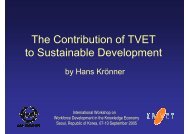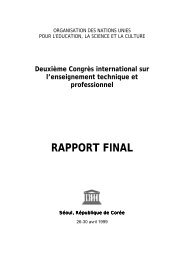Learning for Life, Work and the Future Initial ... - Unesco-Unevoc
Learning for Life, Work and the Future Initial ... - Unesco-Unevoc
Learning for Life, Work and the Future Initial ... - Unesco-Unevoc
Create successful ePaper yourself
Turn your PDF publications into a flip-book with our unique Google optimized e-Paper software.
<strong>Learning</strong> <strong>for</strong> <strong>Life</strong>, <strong>Work</strong> <strong>and</strong> <strong>the</strong> <strong>Future</strong> Participants’ Papers Page 53<br />
tially economically active people into <strong>the</strong> labour<br />
market. There<strong>for</strong>e, <strong>the</strong> re-integration into communities<br />
<strong>and</strong> society of a numerically large number of <strong>for</strong>merly<br />
economically active Basotho males relative to <strong>the</strong><br />
population of Lesotho as a whole is a crucial socioeconomic<br />
issue with a resounding impact.<br />
It is against this background that <strong>the</strong> retrenchment of<br />
Basotho mineworkers could be termed “a national<br />
disaster” (Monyau, 2000, p.10). Whilst retrenchment<br />
may be most acute in Lesotho, o<strong>the</strong>r countries such as<br />
Swazil<strong>and</strong> <strong>and</strong> Mozambique, <strong>for</strong> example, may face<br />
similar difficulties.<br />
3. The Response<br />
There have been a number of positive responses from<br />
<strong>the</strong> NGO sector, parastatals, international donors <strong>and</strong><br />
central government. The Mineworkers Development<br />
Agency (MDA) in Lesotho provides enterprise<br />
development programmes, including vocational skills<br />
training, business training <strong>and</strong> counselling services.<br />
The Ntaflato Training Centre, originally established<br />
with assistance from South Africa’s Department of<br />
Foreign Affairs <strong>and</strong> now under <strong>the</strong> auspices of<br />
Lesotho’s Ministry of Labour, provides vocational<br />
training <strong>and</strong> entrepreneurial skills.<br />
The Lesotho Opportunities Industrialisation Centre<br />
(LOIC) also provides vocational <strong>and</strong> entrepreneurial<br />
skills training, while <strong>the</strong> Basotho Enterprise Development<br />
Corporation (BEDCO) has assisted mineworkers<br />
prior to retrenchment in preparing business plans <strong>and</strong><br />
providing loans to establish micro <strong>and</strong> small enterprises.<br />
Both institutions fall under <strong>the</strong> Ministry of<br />
Trade <strong>and</strong> Industry.<br />
MoE has a number of relevant programmes that help to<br />
address <strong>the</strong> issue of mineworker retrenchment. The<br />
Lesotho Distance Teaching Centre (LDTC) provides a<br />
Basic Education programme in literacy <strong>and</strong> practical<br />
subjects such as poultry-keeping through Radio<br />
Lesotho, local learning centres or “<strong>Learning</strong> Posts”,<br />
<strong>and</strong> self-study materials. With over a hundred<br />
<strong>Learning</strong> Posts throughout <strong>the</strong> country, teaching is<br />
devolved <strong>and</strong> delivered in many of <strong>the</strong> remote<br />
communities most in need. <strong>Future</strong> plans include <strong>the</strong><br />
provision of more subjects <strong>and</strong> recognised certification.<br />
Some post-secondary technical training institutes, such<br />
as Bishop Allard Vocational School in Maseru <strong>and</strong><br />
Leloaleng Trades School in Quthing, have expressed a<br />
desire to offer training <strong>for</strong> retrenched mineworkers <strong>and</strong><br />
o<strong>the</strong>rs in <strong>the</strong> in<strong>for</strong>mal sector. The German development<br />
organisation GTZ <strong>and</strong> <strong>the</strong> World Bank have<br />
committed funding <strong>for</strong> <strong>the</strong> development of this sector.<br />
However, much of <strong>the</strong> dem<strong>and</strong> <strong>for</strong> skills <strong>and</strong> entrepreneurship<br />
training lies in rural <strong>and</strong> remote localities.<br />
In <strong>the</strong>se areas, education <strong>and</strong> training facilities are<br />
under-resourced or even non-existent.<br />
An example of an initiative by MoE to target remote<br />
areas is a collaborative venture between Lesotho’s<br />
Technical, Vocational <strong>and</strong> Higher Education Department<br />
(TVD) <strong>and</strong> Skillshare International (<strong>for</strong>merly<br />
Skillshare Africa). TVD is part of MoE <strong>and</strong> Skillshare<br />
International is a UK-based NGO working in Africa<br />
<strong>and</strong> Asia. In 1998, <strong>the</strong>y implemented <strong>the</strong> phased<br />
introduction of a joint five-year project funded by <strong>the</strong><br />
UK National Lottery (Skillshare Africa 1998). The<br />
focus of <strong>the</strong> project is poverty alleviation.<br />
One important str<strong>and</strong> of <strong>the</strong> project is <strong>the</strong> provision of<br />
TVET to <strong>the</strong> unemployed in remote areas. A key<br />
group of primary beneficiaries is retrenched mineworkers.<br />
The participatory <strong>and</strong> inclusive methodology<br />
in <strong>the</strong> planning of TVET within <strong>the</strong> project has been<br />
deliberately adopted to encourage ownership <strong>and</strong><br />
development of central government initiatives by local<br />
communities. In this way, addressing <strong>the</strong> issue of retrenched<br />
mineworker unemployment also af<strong>for</strong>ds <strong>the</strong><br />
opportunity <strong>for</strong> <strong>the</strong> rejuvenation of beleaguered<br />
communities.<br />
The process of developing training programmes in one<br />
pilot area has involved a community-based approach.<br />
Community leaders <strong>and</strong> <strong>the</strong> community as a whole<br />
have participated in discussion, consultation, planning<br />
<strong>and</strong> decision-making. The participative nature of <strong>the</strong><br />
process contributes to its enrichment <strong>and</strong> to <strong>the</strong><br />
empowerment of <strong>the</strong> community.<br />
In an increasingly devolved system of government<br />
administration, local Heads of Government Departments,<br />
District Administrators <strong>and</strong> <strong>the</strong> District Development<br />
Committee have been consulted. The Village<br />
Development Committee <strong>and</strong> a village meeting, or<br />
pitso, contributed to <strong>the</strong> identification of training needs<br />
<strong>and</strong> estimation of resources. Through ownership, <strong>the</strong><br />
community is able to exercise important influence on<br />
its own future; because of decentralisation, <strong>and</strong> with<br />
o<strong>the</strong>r stakeholders taking more responsibility, TVD has<br />
more of a facilitative, monitoring <strong>and</strong> advisory role.<br />
4. The Challenge<br />
The participative approach to addressing <strong>the</strong> issue of<br />
retrenched mineworker unemployment af<strong>for</strong>ds <strong>the</strong><br />
opportunity <strong>for</strong> empowerment of communities. However,<br />
as long as <strong>the</strong> issue is addressed primarily after<br />
retrenched mineworkers have arrived home, it is<br />
essentially a reactive approach. Given <strong>the</strong> scale <strong>and</strong><br />
impact of mineworker retrenchment <strong>for</strong> Lesotho, a<br />
more pro-active approach is perhaps required.<br />
Also, most of <strong>the</strong> current provision <strong>for</strong> retrenched<br />
mineworkers is unco-ordinated <strong>and</strong> geared to <strong>the</strong> in<strong>for</strong>mal<br />
sector as a whole. There is no overall national<br />
strategy to address solely <strong>the</strong> needs of retrenched<br />
mineworkers in particular, <strong>and</strong> to ameliorate <strong>the</strong> social<br />
<strong>and</strong> economic impact that <strong>the</strong> high level of retrenchment<br />
is having at community <strong>and</strong> national level. Nor is





